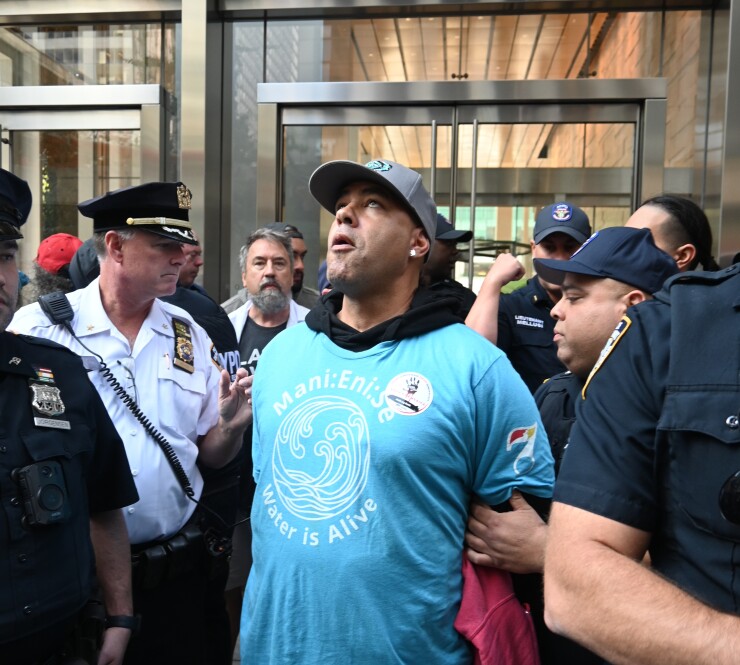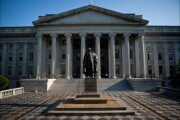How badly must someone want to stop the construction of a natural gas pipeline to come to New York City and risk getting arrested during a protest?
Ask Jason Keck, who lives in Reidsville, North Carolina. He was arrested on Tuesday morning outside the Bank of America Tower in Manhattan while protesting BofA's participation in the financing of the Mountain Valley Pipeline project, which is being built in parts of Virginia and West Virginia.
While Keck did not plan to be arrested, he said in an interview that he felt an obligation in the moment to represent people who are concerned about the pipeline's development.
"Just look at the alternative. The alternative is that our communities become toxic," said Keck, who was released after more than three hours in custody.
Keck was among dozens of climate activists arrested in New York City earlier this month for blocking entrances into the offices of BofA, as well as Citigroup and the Federal Reserve Bank of New York.
They were protesting what they say is a lack of action to address climate change amid continued funding for new fossil fuel projects.
The protests were organized by a coalition of advocacy groups including Climate Defenders and Stop the Money Pipeline, and were timed to coincide with Climate Week NYC.
That event, which is held annually around the time of the United Nations General Assembly, convenes public- and private-sector representatives to focus on the need to address climate change.
Alec Connon, co-director of Stop the Money Pipeline, a coalition of climate finance and environmental advocacy groups, said that being arrested is a "last resort" and "not an enjoyable experience" for any protester.
Connon was arrested outside Citi's New York headquarters on Sept. 14 and again on Sept. 18 outside the New York Fed.
"People are growing increasingly alarmed about the real-world impact of the climate crisis," Connon said. "As that continues, I think the intensity of protests will only grow from what it has been over the last week."
Environmental advocacy and activism goes back decades and has often targeted oil and gas companies directly. More recently, protest campaigns have begun to target banks that provide financing for fossil fuel-based energy projects.
Amid pressure to support a transition away from fossil fuels, banks have taken incremental steps to account for the environmental impact of their business activities and support the development of clean energy. But those steps fall short of what protesters are demanding.
Climate activists have been targeting the four largest U.S. banks — BofA, Citi, JPMorgan Chase and Wells Fargo — because they continue to account for a large percentage of global financing for the fossil fuel industry, Connon said.
The Mountain Valley Pipeline is a $6.6 billion project that first broke ground in 2014 and was supposed to be completed by 2018, but has faced a series of regulatory hurdles and legal opposition.
Political support to finish the pipeline's initial construction was secured as part of a deal to pass last year's
In July, the U.S. Supreme Court allowed work on the nearly completed pipeline project to resume by temporarily blocking a lower-court decision to halt construction.
Keck said that a proposal to expand the pipeline beyond its original 304-mile route — that extension into two North Carolina counties has yet to be built — would harm local communities and Indigenous lands. Keck's heritage is from the Choctaw Native American tribe in Louisiana.
The "nasty Appalachian eyesore" would disrupt local wildlife habitats and toxify water supplies, profiting corporations and their investors without returning wealth to local residents, he said.
Large U.S. banks that are financing the pipeline's development are "ignoring facts for profit," Keck said. "They've written these communities off."
A Bank of America spokesperson did not respond to a request for comment on the protests.
BofA, which has also been pressured by the Sierra Club to stop extending credit to the developers of the Mountain Valley Pipeline, has kept a low public profile on the project.
But the Charlotte, North Carolina-based bank has made recent commitments to reach net-zero emissions across its operations and financing portfolio by 2050.
As part of that commitment, BofA has said that it's aiming to cut energy use from its operations by 55% and to reduce location-based greenhouse gas emissions by 75%.
A Citigroup spokesperson said that the New York-based bank respects the right of climate activists to protest peacefully and regularly engages with stakeholders in its business operations.
Citi "supports the transition to a low-carbon economy" and is working with clients "as they seek to decarbonize their businesses," the spokesperson said in an email.
"Our approach reflects the need to transition while also continuing to meet global energy needs," the spokesperson said. Citi has committed to reaching $1 trillion in sustainable financing initiatives by 2030 and net-zero emissions by 2050.
A spokesperson for the New York Fed declined to comment on the protests.
The New York Fed is hosting its second annual Environmental Economics and Policy Conference next month in partnership with Columbia University.
At last year's event, New York Fed President John Williams
Climate risk has "already begun to impose substantial economic costs globally," Williams said at the 2022 event, acknowledging the potential impact on the stability of the financial system. "Potential risks are constantly evolving and can impact our core responsibilities."
Connon of Stop the Money Pipeline said that the demonstration at the New York Fed was meant to send a message to bank regulators that more action needs to be taken to "step in and regulate Wall Street's ability to continue financing fossil fuel expansion."
Judith Crosbie, a spokesperson for The Sunrise Project, a nonprofit climate advocacy group, said that banks are pursuing short-term profits by financing new fossil-fuel projects.
"Why approve a new project this year, which probably won't be built for five years and will then be in operation for 40 years? If you're investing that much, decisions should be made in a far more cleaner and sustainable way," Crosbie said in an interview.
She said that banks are making decisions based on the interests of a small number of companies and their shareholders. "We're asking for them to switch gears away from longstanding clients that refuse to come up with credible transition plans," she said.
For his part, Keck said that long-term planning in support of environmental conservation is one of the "premises of action" for many Indigenous communities across North America.
"We make decisions based on what will be good for seven generations from now," Keck said. "And right now, I'm not seeing a pretty picture ahead."











